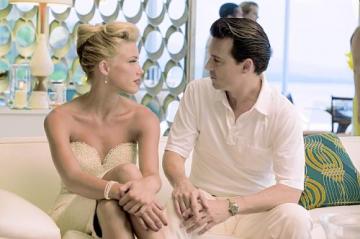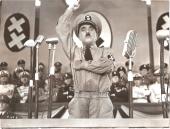'The Rum Diary' raises a glass to Johnny Depp and Hunter S. Thompson
Friday, October 28, 2011
"The Rum Diary" -- Hunter S. Thompson's first novel -- chronicles the late great gonzo journalist's fear and loathing in Puerto Rico, where he sought a freelance reporting gig at San Juan's not-so-great English-language newspaper. It opens in the fabulous fall of 1960, when miracles could still happen, with a couple prescient predictions.
"It's Roberto's year!" declares a sports writer, of the island's favorite son. "Pittsburgh over the Yankees!" Others scoff, while a TV screen shows five-o'clock-shadowy Richard Nixon and his young opponent in the first presidential campaign debate. "The Irish guy's gonna win," says Paul Kemp, "but they'll never let him live ..."
Fat's in the fire everywhere.
Kemp (Johnny Depp), the fictionalized Thompson, is undergoing a pre-mid-life crisis, searching for his writer's voice and niche among the cynical ex-pats, vagrant writers and rum-soaked strangers in paradise. A violent wildcat strike against the paper is in progress when Kemp shows up, fresh from a big bender the night before, trying to hide his horribly bloodshot eyes behind sunglasses ("conjunctivitis," he explains). A seedy photographer, Sala (Michael Rispoli), becomes his mentor. A drunken-sot "religion editor" (Giovanni Ribisi) staggers incoherently through the newsroom, while frustrated editor Richard Jenkins tears his toupee out by the adhesive roots.
"What do you know about horoscopes?" he quizzes Kemp. "You're not 'artistic,' are you?" i.e., gay. "You might wanna rethink the menthol cigarettes."
Kemp is rethinking mostly about Chenault (Amber Heard), the gorgeous blonde he discovered skinny-dipping near his hotel. She just flew in "on Boyfriend Airlines" to shack up with shady entrepreneur Aaron Eckhart.
This pristine isle is poised to become a lot less pristine if the hotel real-estate developers get their way. With Cuba lamentably removed from their sphere by Castro, they want to turn Puerto Rico into a new one-stop service center for rich capitalists. Kemp is recruited to write favorable articles for them. Or should he heed a qualm and try to take the bastards down?
"The average guy doesn't rock the boat because he wants to climb onto it," Kemp is told. The resulting cruise, on a calm sea of money, can be very pleasant -- unlike most of the characters and their activities: drunken brawls with the locals, bloody cockfights, rampant graft and corruption, and, of course, lots of drugs -- including the new one that produces a hallucinatory "trip." When Sala's tongue extends three feet toward Kemp, he cries, "You're giving me fear!" A lobster explains the meaning of life. "What'd we take?" he asks. "I don't know," says Sala. "We need to get some more," says Kemp.
But Mr. Depp and the film take their good old time to establish themselves -- and our interest. With his clueless persona and his hair in a Big Boy front flip, Kemp's funny formal delivery conveys a hint of Jack Sparrow. Our Gonzo-to-be with his portable Royal typewriter worries.
"I don't know how to write like me," he says.
Ms. Heard is hot, Mr. Eckardt just hot-headed. Mr. Jenkins is apoplectic as ever. Mr. Rispoli and Mr. Ribisi are more repulsive than likable sidekicks -- very strange casting, indeed.
This is Mr. Depp's second pass at a Thompson movie adaptation. They were good pals and, according to suburban myth, Mr. Depp "accidentally" discovered the hitherto unpublished "Rum Diary" manuscript while visiting Thompson's house in Woody Creek, Colo. Pass Number One was "Fear and Loathing in Las Vegas" (1998), a painfully excessive effort directed by Terry Gilliam.
Bruce Robinson got the directorial (and screenwriting) nod this time, and does a serviceable if not inspirational job. The ending is lame. He injects a few terrific images -- American bowlers knock down rum bottles set up as tenpins, a turtle wears a sequined jacket over its shell -- but not enough of them.
Problem is the book itself, written while Thompson was living in Orange County, New York, reporting for The Times Herald Record. The official reason for his termination there was "assaulting a vending machine with his bare feet," but some maintain he shot it with a pistol. "Run Diary," in any case, is Almost Juvenilia -- a Portrait of the Artist as a Young Reprobate. Although just in his mid-20s when he wrote it, Thompson (and Kemp) were already obsessed with becoming "over the hill."
The brilliant actor playing him is, incredibly enough, now 48! And this portrait doesn't quite measure up to "Edward Scissorhands," "Ed Wood," "Sweeney Todd" -- the Tim Burton collaborations -- or the "Pirates of the Caribbean" series.
"Rum Diary" doesn't measure up to (my personal favorite) "Fear and Loathing on the Campaign Trail '72," but both the book and film harbinger Thompson's wonderfully relentless lifetime hatred of Richard Nixon. ("He was a swine of a man and a jabbering dupe of a president.") There's a seed or two of his run for sheriff of Pitkin County, Colo., on the Freak Power ticket -- during which he shaved his head and referred to his crew cut Republican rival as "my long-haired opponent." Almost won, too.
"Diary" is a tribute and celebration of Thompson. The thought counts perhaps more than the movie. But the premature fear and loathing of aging is grimly relevant. Thompson committed suicide at age 67, leaving a note that said, "Act your old age. Relax, this won't hurt." At his request, his ashes were launched by a cannon from a tower (shaped like a fist holding a peyote button) -- with fireworks.
And Johnny Depp, bless him, paid for it.






